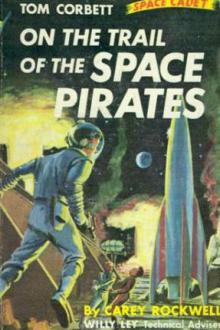Triplanetary, E. E. Smith [reading like a writer TXT] 📗

- Author: E. E. Smith
Book online «Triplanetary, E. E. Smith [reading like a writer TXT] 📗». Author E. E. Smith
He stepped over to his ultra-projector and put in a call for Virgil Samms, whose face soon appeared upon his screen.
“We got it all, Virgil,” he reported. “It’s something extraordinary—bigger, wider, and deeper than any of us dreamed. It may be urgent, too, so I think I had better shoot the stuff in on an ultra-beam and save some time. Fred has a telemagneto recorder there that he can synchronize with this outfit easily enough. Right?”
“Right. Good work, Lyman—thanks,” came back terse approval and appreciation, and soon the steel wires were again flashing from reel to reel. This time, however, their varying magnetic charges were so modulating ultra-waves that every detail of that calamitous battle of the void was being screened and recorded in the innermost private laboratory of the Triplanetary Service.
Eager though he naturally was to join his fellow-scientists, Cleveland was not impatient during the long, but uneventful journey back to Earth. There was much to study, many improvements to be made in his comparatively crude first ultra-camera. Then, too, there were long conferences with Samms, and particularly with Rodebush, the nuclear physicist, who would have to do much of the work involved in solving the riddles of the energies and weapons of the Nevians. Thus it did not seem long before green Terra grew large beneath the flying sphere of the Chicago.
“Going to have to circle it once, aren’t you?” Cleveland asked the chief pilot. He had been watching that officer closely for minutes, admiring the delicacy and precision with which the great vessel was being maneuvered preliminary to entering the Earth’s atmosphere.
“Yes,” the pilot replied. “We had to come in in the shortest possible time, and that meant a velocity here that we can’t check without a spiral. However, even at that we saved a lot of time. You can save quite a bit more, though, by having a rocket-plane come out to meet us somewhere around fifteen or twenty thousand kilometers, depending upon where you want to land. With their drives they can match our velocity and still make the drop direct.”
“Guess I’ll do that—thanks,” and the operative called his chief, only to learn that his suggestion had already been acted upon.
“We beat you to it, Lyman,” Samms smiled. “The Silver Sliver is out there now, looping to match your course, acceleraction, and velocity at twenty two thousand kilometers. You’ll be ready to transfer?”
“I’ll be ready,” and the Quartermaster’s ex-clerk went to his quarters and packed his dunnage-bag.
In due time the long, slender body of the rocket-plane came into view, creeping “down” upon the spaceship from “above,” and Cleveland bade his friends goodbye. Donning a spacesuit, he stationed himself in the starboard airlock. Its atmosphere was withdrawn, the outer door opened, and he glanced across a bare hundred feet of space at the rocket-plane which, keel ports fiercely aflame, was braking her terrific speed to match the slower pace of the gigantic sphere of war. Shaped like a toothpick, needle-pointed fore and aft, with ultra-stubby wings and vanes, with flush-set rocket ports everywhere, built of a lustrous, silvery alloy of noble and almost infusible metals—such was the private speedboat of Triplanetary’s head man. The fastest thing known, whether in planetary air, the stratosphere, or the vacuous depth of interplanetary space, her first flashing trial spins had won her the nickname of the Silver Sliver. She had had a more formal name, but that title had long since been buried in the Departmental files.
Lower and lower dropped the speedboat, her rockets flaming ever brighter, until her slender length lay level with the airlock door. Then her blasting discharges subsided to the power necessary to match exactly the Chicago’s acceleration.
“Ready to cut, Chicago! Give me a three-second call!” snapped from the pilot room of the Sliver.
“Ready to cut!” the pilot of the Chicago replied. “Seconds! Three! Two! One! Cut!”
At the last word the power of both vessels was instantly cut off and everything in them became weightless. In the tiny airlock of the slender plane crouched a space-line man with coiled cable in readiness, but he was not needed. As the flaring exhausts ceased Cleveland swung out his heavy bag and stepped lightly off into space, and in a right line he floated directly into the open port of the rocket-plane. The door clanged shut behind him and in a matter of moments he stood in the control room of the racer, divested of his armor and shaking hands with his friend and co-laborer, Frederick Rodebush.
“Well, Fritz, what do you know?” Cleveland asked, as soon as greetings had been exchanged. “How do the various reports dovetail together? I know that you couldn’t tell me anything on the wave, but there’s no danger of eavesdroppers here.”
“You can’t tell,” Rodebush soberly replied. “We’re just beginning to wake up to the fact that there are a lot of things we don’t know anything about. Better wait until we’re back at the Hill. We have a full set of ultra screens around there now. There’s a couple of other good reasons, too—it would be better for both of us to go over the whole thing with Virgil, from the ground up; and we can’t do any more talking, anyway. Our orders are to get back there at maximum, and you know what that means aboard the





Comments (0)